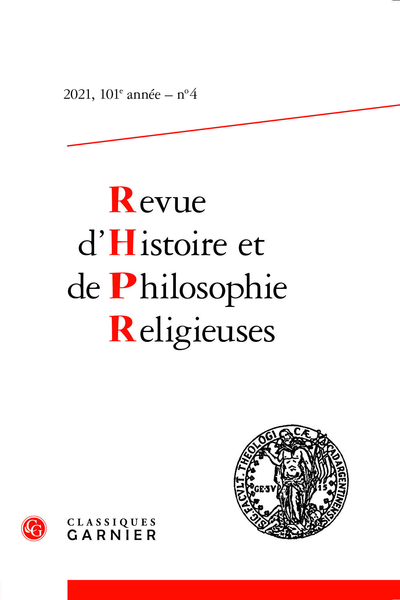
Abstracts
- Publication type: Journal article
- Journal: Revue d'Histoire et de Philosophie religieuses
2021 – 4, 101e année, n° 4. varia - Pages: 597 to 598
- Journal: Journal of Religious History and Philosophy
- CLIL theme: 4046 -- RELIGION -- Christianisme -- Théologie
- EAN: 9782406126966
- ISBN: 978-2-406-12696-6
- ISSN: 2269-479X
- DOI: 10.48611/isbn.978-2-406-12696-6.p.0151
- Publisher: Classiques Garnier
- Online publication: 12-23-2021
- Periodicity: Quarterly
- Languages: French, English
Résumés/Abstracts
Rémi Gounelle, « L’argent dans l’œuvre de Clément d’Alexandrie »
Clément d’Alexandrie est l’un des rares théologiens des premiers siècles du christianisme à avoir analysé le rapport de l’homme à l’argent. Dans son traité Quel riche sera sauvé ? comme dans ses autres œuvres, il fait se rencontrer philosophie hellénistique et Bible, et donne la priorité à la première. Cela suggère que la littérature chrétienne ancienne ne peut apporter au mieux qu’une contribution très modeste à l’élaboration d’une éthique financière chrétienne pour aujourd’hui.
Mots-clés : Clément d’Alexandrie, philosophie hellénistique, argent, éthique financière, richesse.
Rémi Gounelle, “Money in the Works of Clement of Alexandria”
Clement of Alexandria is one of the few early Christian theologians to analyse the human relationship to money. In his treatise Quis dives salvetur?, as in his other works, he reconciles Hellenistic philosophy and the Bible, giving priority to the former. This suggests that ancient Christian literature can make only a very modest contribution, if any, to the development of a Christian financial ethic for today.
Keywords: Clement of Alexandria, Hellenistic philosophy, money, financial ethics, wealth.
Philippe Vallin, « Du démon de Laplace à la providence thomasienne, moyennant le Dieu faible de Hans Jonas »
La providence du Dieu des Chrétiens paraît un mystère insoluble. La mentalité contemporaine oscille entre deux tentations : l’utopie d’une intelligence omnisciente et algorithmique, le « démon de Laplace » ; le renoncement à la toute-puissance de Dieu à cause d’Auschwitz (H. Jonas). Avec la ressource de saint Thomas d’Aquin, nous proposons ici de chercher la providence du Père à l’heure de l’agonie du Fils, et de reconnaître que la providence chrétienne est formellement pascale.
Mots-clés : providence, omniscience, grâce, algorithme, agonie, toute-puissance, croix, passion, déréliction.
598Philippe Vallin, “From Laplace’s Demon to Aquinas’ Providence via Hans Jonas’ Weak God”
The providence of the Christian God seems an insoluble mystery. The contemporary mentality oscillates between two temptations: either the utopia of an omniscient and algorithmic intelligence (“Laplace’s demon”) or the renunciation of the omnipotence of God because of Auschwitz (Hans Jonas). Using Aquinas, we propose to seek the providence of the Father in the hour of the Son’s agony, and to recognise that Christian providence is essentially linked to Easter.
Keywords: providence, omniscience, grace, algorithm, agony, omnipotence, cross, passion, dereliction.
Marc Vial, « Opus absconditum Dei. La théologie de la providence (d’)après Wolfhart Pannenberg »
L’article expose la théologie de la providence de Wolfhart Pannenberg et la met en perspective : en amont, en la pensant en lien avec la théorie de l’opus absconditum défendue par Eberhard Jüngel ; en aval, en montrant qu’une théorie de l’agir divin gagne à être développée en lien avec les trois articles de la foi chrétienne. L’étude fournit en conclusion quelques arguments en faveur de l’affirmation selon laquelle la foi mérite d’être comprise comme une dimension de l’agir providentiel divin.
Mots-clés : providence, conservatio, concursus, gubernatio, foi, mal, W. Pannenberg, E. Jüngel, E. Durand, D. Fergusson.
Marc Vial, “Opus absconditum Dei. The Theology of Providence according to and after Wolfhart Pannenberg”
This article presents Wolfhart Pannenberg’s theology of providence and puts it into perspective: beforehand, thinking it in connection with the theory of opus absconditum defended by Eberhard Jüngel; afterwards, showing that a theory of divine action should be developed in connection with the three articles of the Christian faith. The study concludes with some arguments in favour of the assertion that faith deserves to be understood as a dimension of divine providential action.
Keywords: Providence, conservatio, concursus, gubernatio, faith, evil, W. Pannenberg, E. Jüngel, E. Durand, D. Fergusson.